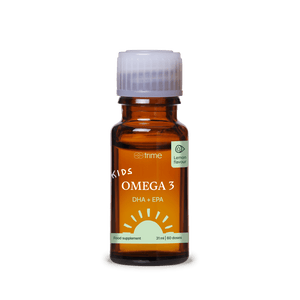The importance of omega-3 fatty acid supplementation for children is one of the frequently asked questions by our customers. We decided to summarize the most important information in this article. At the same time we describe the difference between Kids Omega 3 + D3/K2 and Kids Omega 3 supplements, and which one to choose.
Article at the glance:
- Dietary supplement use during pregnancy and in children
- Importance of DHA
- DHA for brain and cognitive development
- DHA for vision development
- Other benefits of omega-3 supplements for children
- Ensuring sufficient omega-3 during pregnancy
- Difference between products Kids Omega 3 and Kids Omega 3 + D3/K2
- Conclusion
Dietary supplement use during pregnancy and in children
Ensuring the intake of all necessary nutrients solely from commonly available, modern, and predominantly highly processed foods is very difficult nowadays. According to surveys, pregnant women, lactating women, and young children are the most at-risk groups for malnutrition, both in terms of acute and future health risks due to insufficient nutrition.
In order to avoid deficits of some key nutrients, vitamin D and vitamin K are routinely administered in pediatric practice. Omega-3 fatty acids are also often discussed in connection with appropriate supplementation for children.
"It is necessary to realize that insufficient nutrition in the smallest children not only creates an acute risk of malnutrition and associated health consequences (low immune functions, developmental defects, etc.), but also increases the risk of future diseases in adulthood, so-called fetal and nutritional programming." explains Jakub Přibyl, nutritional specialist and author of Trime supplement's formulas. "A balanced diet and smartly chosen supplementation will thus help meet the nutritional needs and enable the normal development of infants and toddlers."
Importance of DHA
Omega-3 fatty acids are an important component of the fats in our diet, with the most important omega-3 fatty acids being eicosapentaenoic acid (EPA) and docosahexaenoic acid (DHA). DHA is particularly important for young children during the period of rapid brain development. DHA represents a structural fatty acid found in the human brain, skin and retina. This semi-essential fatty acid is necessary for ensuring the normal development of the central nervous system and supports, for example, the proper functioning of the brain, cognitive functions, memory and vision.
EFSA (European Food Safety Authority) confirms the importance of DHA in relation to normal brain development. For pregnant women, lactating women and children under 2 years of age, there is a daily reference dose for the intake of solely DHA fatty acid.
DHA for brain and cognitive development
DHA is an important building block that affects communication between neurons in the brain. During pregnancy and in the first few years of life, when the baby's brain develops very quickly, DHA is especially important to ensure normal brain growth and development. Adequate DHA intake during early childhood is associated with better cognitive outcomes (for example, memory and sustained attention).
"In children with a deficiency of omega-3, or DHA, there is a risk that the development of central nervous system functions will not be normal and incorrect psychomotor development may occur, including a reduction in the intelligence quotient." adds Jakub Přibyl.
DHA for vision development
DHA is also a structural component of the retina of the eye and helps in the development and maintenance of healthy vision. Sufficient intake of this fatty acid in children is associated with better visual acuity and a reduced risk of vision problems.
Other benefits of omega-3 supplements for children
Hyperactivity, impulsivity and difficulty concentrating in children are symptoms associated with attention deficit hyperactivity disorder (ADHD). According to some research, dietary supplements containing omega-3 fatty acids may reduce symptoms of ADHD in children.
Some studies have also found that omega-3 dietary supplements help relieve symptoms of asthma, a chronic disease that causes breathing difficulties.
Ensuring sufficient omega-3 during pregnancy
Newborn and breastfed children are reliant on external sources of omega-3 fatty acids, most commonly through breast milk. The content of omega-3 in breast milk varies and depends on the mother's own omega-3 intake. Mothers consuming modern eastern diets rich in omega-6 are typically deficient in omega-3 and so they have lower levels of omega-3 in their breast milk. Omega-3 supplementation during pregnancy may also reduce the risk of preterm birth and the risk of low birth weight in the newborn. The intake of omega-3 fatty acids is important not only for the organism of the newborn, dependent on the intake of nutrients from breast milk, but also for the mother. Omega-3 has been shown to prevent depressed mood in late pregnancy and early postpartum.
Difference between products Kids Omega 3 and Kids Omega 3 + D3/K2
Our children's product line differs from food supplements for adults in both the composition and concentration of active substances, as well as their ratios. The composition is adapted to the nutritional profile of the smallest children from the age of 12 months and is designed in such a way that its supplementation prevents the occurrence of a dangerous deficit.
Kids Omega 3 + D3/K2 is a more complex product combining the semi-essential fatty acids DHA and EPA with vitamins D3 and K2 and covers the daily required dose of all these 3 key nutrients.
Kids Omega 3 supplement serves rather to seasonally cover the omega-3 fatty acids. Its use may be more appropriate during the summer, when children naturally synthesize vitamin D by exposing their skin to sunlight.
There is no need to use both supplements at the same time. Both Kids Omega 3 and Kids Omega 3 + D3/K2 contain the same omega-3 fatty acids. However, the Kids Omega 3 + D3/K2 supplement also contains vitamins D3 and K2 that are often deficient.
Conclusion
Omega-3 fatty acids can be obtained naturally from food, for example, wild fatty fish (salmon, mackerel, sardines). Some children consume these foods only in small quantities. And moreover, the frequent consumption is not recommended for pregnant women, nursing mothers and children, because of the possible increased burden of heavy metals. From this point of view, it is much better to ensure sufficient intake through a dietary supplement.
Sources:
Innis SM. Dietary omega 3 fatty acids and the developing brain. Brain Res. 2008 Oct 27;1237:35-43. doi: 10.1016/j.brainres.2008.08.078. Epub 2008 Sep 9. PMID: 18789910.
Jackson KH, Harris WS. A Prenatal DHA Test to Help Identify Women at Increased Risk for Early Preterm Birth: A Proposal. Nutrients. 2018 Dec 6;10(12):1933. doi: 10.3390/nu10121933. PMID: 30563193; PMCID: PMC6316227.
Zhang, MM., Zou, Y., Li, SM. et al. The efficacy and safety of omega-3 fatty acids on depressive symptoms in perinatal women: a meta-analysis of randomized placebo-controlled trials. Transl Psychiatry 10, 193 (2020).
Willatts P, Forsyth S, Agostoni C, Casaer P, Riva E, Boehm G. Effects of long-chain PUFA supplementation in infant formula on cognitive function in later childhood. Am J Clin Nutr. 2013 Aug;98(2):536S-42S. doi: 10.3945/ajcn.112.038612. PMID: 23783296.
Derbyshire E. Do Omega-3/6 Fatty Acids Have a Therapeutic Role in Children and Young People with ADHD? J Lipids. 2017;2017:6285218. doi: 10.1155/2017/6285218. Epub 2017 Aug 30. PMID: 28951787; PMCID: PMC5603098.
Nagakura T, Matsuda S, Shichijyo K, Sugimoto H, Hata K. Dietary supplementation with fish oil rich in omega-3 polyunsaturated fatty acids in children with bronchial asthma. Eur Respir J. 2000 Nov;16(5):861-5. doi: 10.1183/09031936.00.16586100. PMID: 11153584.



















